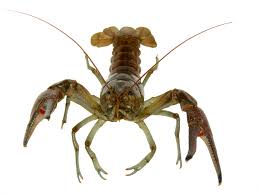crayfish
英 [ˈkreɪ.fɪʃ]
美 [ˈkreɪ.fɪʃ]
- n. 小龙虾

记忆方法
记住“crayfish”可以通过联想记忆法,将其分解为“cray”(螃蟹的形状)和“fish”(鱼)。想象一种类似于螃蟹的动物,但通常生活在水中,这样的形象可以帮助你记住这个词。
以上内容由AI生成, 仅供参考和借鉴
中文词源
crayfish 刺龙虾
来自古法语crevice,词源同crab, 拼写受fish影响俗化。
英语词源
- crayfish
-
crayfish: [14] The crayfish is related etymologically as well as biologically to the crab. The Old High German word for ‘crab’ was krebiz (source of modern German krebs). This was borrowed into Old French as crevice (modern French has preserved the variant form écrevisse), and transmitted to Middle English as crevis. Association of the final syllable with fish led by the 16th century to its transformation to crayfish (a variant Middle English form cravis became crawfish).
=> crab, crawfish - crayfish (n.)
- "small, freshwater lobster," early 14c., crevis, from Old French crevice "crayfish" (13c., Modern French écrevisse), probably from Frankish *krebitja or a similar Germanic word that is a diminutive form of the root of crab (n.1); compare Old High German krebiz "crab, shellfish," German Krebs. Modern spelling is 16c., under influence of fish (n.).
权威例句
- 1. We don't have oysters tonight, but the crayfish are very good.
- 我们今晚没有牡蛎供应.但小龙虾是非常好.
- 2. We do not have oysters tonight, but the crayfish are very good.
- 我们今晚没有牡蛎供应.但小龙是非常好.
- 3. Crayfish looks like langostines but is not as tasty.
- 漓蛄长得很像龙虾,但味道可没有龙虾鲜美.
- 4. BOY: How come so many crayfish live under the rocks and stuff?
- 男孩: 为什么这么多小龙虾住在岩石和那些东西下面?
- 5. The red swamp crayfish carries the virus of a deadly fungal disease.
- 红色龙虾带有一种致命的真菌疾病.
